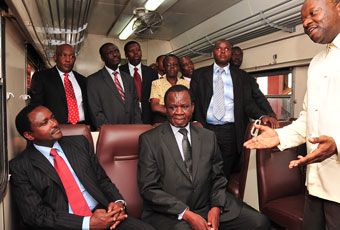
By Patrick Kagenda
When Kenyan Vice president Kalonzo Musyoka visited Kampala last month, the Rift Valley Railways-run Nalukolongo locomotive workshop was part of his itinerary.
News has since emerged that the RVR had paid the governments of Kenya and Uganda $2 million and $1 million respectively in the long awaited outstanding concession fees.
In the same period news emerged that Charles Mbire a Ugandan tycoon had been invited by the shareholders of the Rift Valley Railways to buy shares in the company. Mbire was given up to15% of the shares in the company.
Jim Mugunga the spokesperson of the government privatization unit confirmed that the RVR had paid the two governments some money as a result of the pressure the governments had put on it. “This means the efforts by the two governments to pressurise RVR to pay or pull out are beginning to bear fruit,” said Mugunga.
Mugunga however told the independent he could not comment on the Mbire issue as it is an RVR board affair.
As long as the RVR shareholders were in default of paying concession fees, the two governments had the powers to give ultimatums and threats of cancellation of the concession. But last week’s joint commission meeting in Nairobi took place under different circumstances because RVR had paid up the concession fees.
Former Uganda railways Managing Director Enos Tumusime reacted to the Mbire’s 15% shares in RVR. “Why should a national asset be given to an individual like that?It flouts the PPDA act and regulations, is not transparent, it’s unethical and uncompetitive,” he said.
Mbire was first named to the RVR board in September 2008 by then Finance minister Ezra Suruma as a means of safeguarding Uganda’s interests in the deal. His personal windfall has got many asking how it benefits the country and what could have changed things at RVR that a Ugandan has been allowed to own 15% of the shares? Which side of the political lining is he on and whose interest, if any, in Kampala is Mbire representing?
Two weeks earlier there had been a heated disagreement in Nairobi when Roy Puffet, the principle shareholder in Sheltam which holds majority shares in the RVR consortium, circulated a memorandum he had sent to the chairman of RVR, Brown Ondego, revealing that he had sold 49 % of his company to the Ambience Ventures Ltd, which is part of the Citadel Capital of Egypt.
Under the deal, Puffet was to retain majority control of Sheltam. The memo announcing the entry of the wealthy Egyptian investors into the most confused privatisation transaction was signed and endorsed by all shareholders of the RVR except Trancentury, meaning that the rest of the shareholders of RVR, with an 80 % stake in the company had ganged up against Trancentury to support the arrival of the Egyptians into RVR.
In that week, the Ugandan state minister for works John Byabagambi told The Independent that “the government of Uganda was determined to throw out RVR but since it is a concession between the two countries, we have to move together”. “We can’t throw RVR out ourselves in spite of our resolve to do so because the train passes through Kenya”.
A source in Nairobi had told The Independent that, “RVR`s ejection is complicated by the fact that there are two political factions to it. Both Kenyan president Mwai Kibaki and his prime minister Raila Odinga have vested interest in the RVR. That is the reason the RVR is still afloat. It’s the politics involved that is hindering the exit of the RVR”.
Kalonzo Musyoka and Raila Odinga challenged and lost to Mwai Kibaki in the last presidential elections in Kenya. Kibaki, however, moved quickly to woo Musyoka by appointing him vice president. Odinga’s invitation to the power-sharing arrangement took a more winded route and was vociferously opposed by Musyoka. Meanwhile, Ondego is a strong Odinga ally. Seeing Odengo and Musyoka at Nalukolongo was, therefore, very informative in the context of the Kenyan political interests in the RVR deal.
According to information disclosed in the prospectus which Transcentury put out as the company floated a private placement share floatation in 2008, among its top ten shareholders include the managing director of Ken Gen, Eddy Njoroge, the Commissioner General of Kenya Revenue Authority, Michael Waweru, and influential businessmen Peter Kanyago, Jimna Mbaru, Zaph Gitau Mbugua and Joe Karago.
Eddy Njoroge is a long-time Kibaki fund-raiser and friend. Peter Kanyago is a longtime Kibaki supporter from the same Othaya constituency. The others are longtime business and political associates.
Industry experts told the independent the RVR had failed to raise the capital to inject into its operations and that the money they recently paid to the two governments came from the Egyptians who recently purchased a 49 % stake of Sheltam Rail from South African Roy Puffet in a deal whose legality has been challenged by the government of Kenya but which has been endorsed by Kampala. So far, Transcentury appears to be the only losers in the deal.
 The Independent Uganda: You get the Truth we Pay the Price
The Independent Uganda: You get the Truth we Pay the Price


